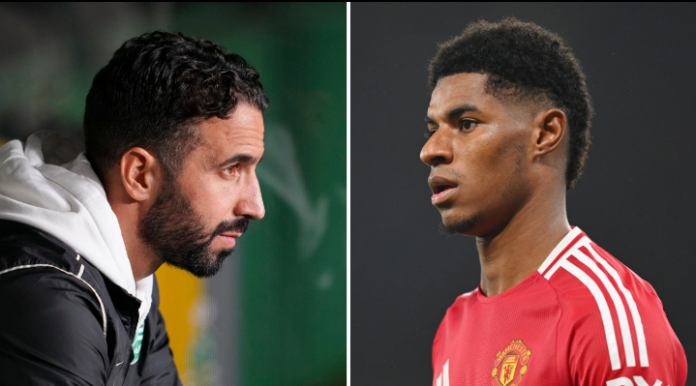Is talent enough to fit into a manager’s vision, or does tactical discipline outweigh raw ability? In the case of Marcus Rashford and Ruben Amorim, the answer reveals a deeper truth about modern football.
In the fast-evolving world of football, every manager seeks a squad that mirrors their tactical philosophy—a team crafted to execute their vision with precision. Ruben Amorim, Sporting CP’s ambitious manager, has been making waves with his distinct style of play. Recently, a fascinating discussion has emerged around whether Manchester United’s Marcus Rashford could fit into Amorim’s tactical puzzle. While Rashford’s talent is undeniable, the answer—for now—leans toward a surprising NO. Here’s why.
Amorim’s Tactical Blueprint

Amorim’s football philosophy revolves around structured yet dynamic gameplay. His preferred 3-4-3 system emphasizes high pressing, positional discipline, and quick transitions. It demands players who can both adhere to a tightly-knit framework and possess the tactical intelligence to make split-second decisions.
Under Amorim, versatility is non-negotiable. Wing-backs must transition seamlessly between defensive duties and attacking runs. Forwards need to be as efficient off the ball as they are on it, creating spaces and contributing defensively when required.
This is where the clash arises.
The Rashford Conundrum
Marcus Rashford has been a pivotal figure for Manchester United, thanks to his electric pace, clinical finishing, and ability to deliver in key moments. His attributes make him a nightmare for defenders, especially in counter-attacking scenarios. However, these strengths may not perfectly align with Amorim’s current requirements 👇🏽
1. Positional Discipline
Rashford thrives in open spaces, often operating as a free-spirited forward. His strength lies in exploiting defensive gaps rather than maintaining positional discipline, a cornerstone of Amorim’s system. Amorim’s attackers must function as cohesive cogs in a tactical machine, an adjustment that may curtail Rashford’s natural instincts.
2. Defensive Responsibilities
Amorim demands that every player contribute defensively. While Rashford has improved in tracking back under Erik ten Hag, his defensive contributions still fall short of Amorim’s rigorous standards. Amorim’s forwards act as the first line of defense, pressing aggressively and disrupting the opponent’s buildup—a role Rashford has yet to fully master.
3. Tactical Adaptability
Rashford excels in systems that allow for creative freedom. Amorim’s structured setup, while accommodating flair, prioritizes adherence to specific patterns of play. Rashford’s preference for individual brilliance may occasionally clash with the collective-oriented ethos of Amorim’s team.
4. Off the Field Discipline
It is no secret that Marcus Rashford attends a lot of off-field late night parties and lives a celebrity lifestyle. It is rumored that Amorin is concerned about this lifestyle of his and feel he is not fully focused on football unlike before and has made it clear that if he continues like this he won’t be a part of his future plans at Manchester United.
5. The Long-Term Potential..and Consistency
It’s important to note that this doesn’t mean Rashford could never fit into Amorim’s plans. Talents like Rashford, with the right coaching, can adapt and evolve. Under Amorim’s mentorship, Rashford could refine aspects of his game—especially in terms of off-the-ball work and tactical discipline. Rashford doesn’t need glimpses of good football, he needs consistency in his game, meaning he needs to be more serious with his field work.
Moreover, Amorim’s vision is a long-term project. His current approach is heavily influenced by the resources at hand, and as Manchester United continues to evolve, the tactical framework might adapt to accommodate a player of Rashford’s caliber.
Why This Discussion Matters

The Rashford-Amorim debate is a microcosm of modern football’s broader narrative: the delicate balance between individual brilliance and tactical discipline. As football becomes increasingly system-driven, managers like Amorim challenge players to elevate their tactical IQ without losing their unique flair.
For Rashford, the question isn’t just about fitting into Amorim’s system—it’s about embracing a role that demands transformation. For Amorim, it’s about identifying when a player’s extraordinary abilities outweigh their initial incompatibilities.
Conclusion
Ruben Amorim’s master plan is a testament to football’s tactical evolution. Marcus Rashford, with his prodigious skills, represents the epitome of raw talent. But for now, their paths remain parallel, not intersecting.
As Rashford continues to shine for Manchester United and Amorim crafts his legacy, one can’t help but wonder if the future might hold a tactical convergence—a moment when Rashford’s skills and Amorim’s philosophy finally align.
After all, in football, timing is everything.
What are your thoughts on the potential synergy between Rashford and Amorim’s tactics? Let us know in the comments below 👇🏽!


